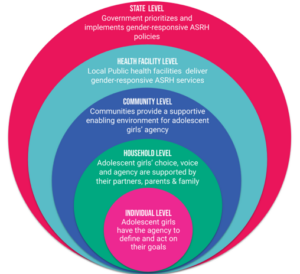“My boyfriend?” Afsa giggles… “His name is Ramo.”
Afsa, 16, has been with Ramo for three years. “He works at the supermarket.”
Although slight in stature, Afsa’s confidence booms. “I want to be a soldier,” she says as she punches the air. “I can run fast.”
Afsa is at PSI Tanzania’s pop up workshop, Kuwa Mjanja (“Be Smart”). This gathering is part of Adolescents 360, a new program that is turning youth engagement in sexual and reproductive health programming on its head.
The workshop is buzzing. At 11 am teenage girls swarm the tent — which popped up in this usually sleepy neighborhood on the outskirts of Dar es Salaam earlier this Saturday morning. In brightly colored dresses and veils, they learn to make jewelry in the shade of the tent. They gossip in small groups and gather around tables covered in trendy fabrics right out of any teenage decorating magazine.
76 teens in all visit the pop up for the next few hours.
Behind this hub of activity, a PSI-trained health care provider waits patiently and discreetly behind a privacy curtain. She’s available to chat with the girls about pregnancy prevention when and if they want.
Through Adolescents 360, PSI uses Silicon Valley-style human-centered design tactics to co-create activities like these with the teens they serve. They found out early on that the term “family planning” doesn’t resonate with this generation.
Afsa says, “Ramo and I don’t want a baby. That’s why I came today.” She doesn’t mention family planning. A friend of hers, one of PSI’s peer ambassadors, encouraged Afsa to come. “She told me it would be cool. That other girls like me would be here.“
That’s what Kuwa Mjanja is all about — appealing to teens with language they use and activities that they’ve requested themselves.
The Kuwa Mjanja campaign is branded by colorful pineapples — the kind a teenage girl might doodle in her notebook. PSI-trained coordinators like to tell the girls, “Pineapples are special. They stand tall and proud. They wear a crown, like a queen who knows her worth and demands respect. And even though they are tough on the outside, they are beautiful and sweet on the inside.”
This describes Afsa perfectly.
She had heard a lot of myths about contraception. “I thought an implant would make you fat. That it could disappear into your body. And that I’d get my period all of the time.”
After talking in private with Edda, the PSI provider who has a daughter of her own, Afsa decided to get an implant that day. 29 other girls also decided to get contraception or 39% of the attendees.
Afsa says, “I’m in school. If I keep it up, I might be able to something more.”
The need to reimagine reproductive health care is urgent.
The interdependent world we live in is evolving fast and Africa’s youth population is surging. In Tanzania alone, 45% of the population is under the age of 15 and 44% of girls become pregnant by age 19. PSI’s Adolescent 360 program meets teens where they are — outside of clinics — and with language and activities that make sense for them.
Sometimes the most innovative projects are the simplest ones.
Adolescents 360 (A360) is a four-and-a-half year initiative co-funded by the Bill & Melinda Gates Foundation and the Children’s Investment Fund Foundation (CIFF). The project is led by Population Services International (PSI) together with IDEO.org, University of California at Berkeley Center on the Developing Adolescent, the Society for Family Health Nigeria, and Triggerise. The project is being delivered in Ethiopia, Nigeria and Tanzania, in partnership with local governments, local organizations, and local technology and marketing firms. In Tanzania, A360 is building on an investment and talent from philanthropist and design thinker Pam Scott.



